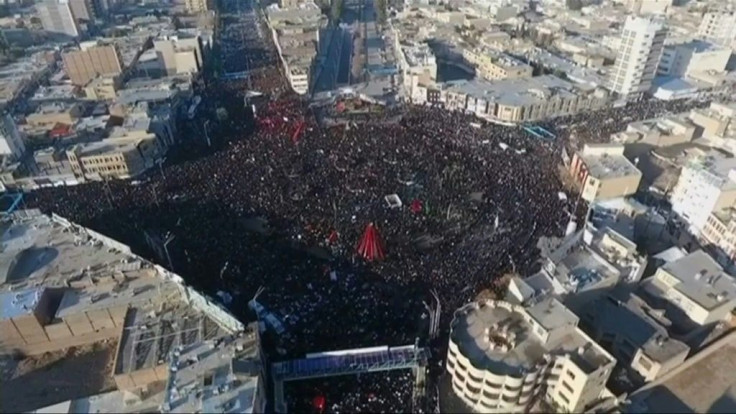Tuesday's Stock Market Open: US Equities Open Lower As Traders Assess Threats By Iran

KEY POINTS
- Crude oil futures are easing again after a spike
- Eurozone inflation came in higher than expected in December
- Iran reportedly is considering 13 scenarios for retaliation
U.S. stocks traded mixed Tuesday as traders appeared to have a somewhat muted reaction to threats of retaliation by Iran after last week’s U.S. drone strike in Baghdad that killed Iranian Gen. Qassem Soleimani.
The Dow Jones Industrial Average dropped 111.36 points to 28,592.02 while the S&P 500 shed 8.59 points to 3,237.69 and the Nasdaq Composite Index edged up 4.04 points to 9075.50.
Iran’s Fars news agency reported that Iran is considering 13 possible retaliation 'scenarios' against the U.S. "Even if all agree on the weakest scenario, yet it will bring a historic nightmare for America,” Iran’s Supreme National Security Council Secretary Ali Shamkhani said.
“Investors starting on Monday began to downplay the importance of Soleimani and that sentiment carried over to international markets on Tuesday,” said Adam Crisafulli, founder of Vital Knowledge. “Investors aren’t oblivious to rising Middle Eastern tensions, but they’re placing Soleimani in the same category as the recent Iranian strikes against Saudi oil assets -- a risk, but not only immediately fatal to the present equity narrative.”
Dryden Pence, chief investment officer at Pence Wealth Management, said markets are not overly concerned about the Iran crisis’ impact on oil prices since U.S. crude production has climbed in recent years.
“We are the biggest oil producer in the world and we’re able to make up what’s lost from Iran,” Pence said. “If you took Iran completely out of the oil market, that’s not a big deal. That’s why the market reaction has been so muted compared to what it would’ve been 10 years ago.”
Gerald Feierstein, former U.S. ambassador to Yemen, told CNBC Iran’s proxy allies – in Iraq, Syria, Lebanon, and Yemen -- may help retaliate.
“They have allies, Hezbollah and other organizations [such as] Kataib Hezbollah in Iraq, the Houthis in Yemen and possibilities outside,” he said. “I don’t think we should only look for Iranian responses in the Middle East. The Iranian response, which I think will almost certainly come, could come in many different guises, many different places at any time. This is going to keep the world on edge I think, for quite a long period while the Iranians think through their strategy.”
The Senate Finance Committee approved the new North American trade deal with Mexico and Canada on Tuesday. The panel will send the United States-Mexico-Canada agreement to the full Senate, which could pass the deal this month.
In economic data, the U.S. trade deficit fell to its lowest level in three years in November 2019. U.S. exports climbed by $1.4 billion to $208.6 billion while imports skidded $2.5 billion to $251.7 billion. Year-to-date, the total deficit of goods and services fell $3.9 billion, or 0.7%, from the same period in 2018.
Inflation in eurozone rose from 1% to 1.3% -- a six-month high -- in December 2019, but still far below the European Central Bank’s target of 2%. Statistics agency Eurostat said the core inflation rate, which excludes volatile items such as tobacco and energy, remained steady at 1.3%.
Overnight in Asia, markets finished higher. China’s Shanghai Composite rose 0.69%, while Hong Kong’s Hang Seng gained 0.34%, and Japan’s Nikkei-225 surged 1.6%.
In Europe, markets finished mixed, with Britain’s FTSE-100 down 0.05%, France’s CAC-40 rose 0.13% and Germany’s DAX gained 0.78%.
Crude oil futures were down 1.07% at $62.59 per barrel and Brent crude dropped 1.1% at $68.15. Gold futures rose 0.25%.
The euro dropped 0.5% at $1.114 while the pound sterling fell 0.33% at $1.3124.
© Copyright IBTimes 2024. All rights reserved.





















